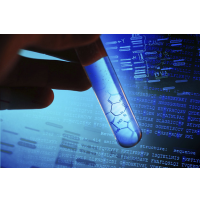Humans Mold Animals at Will: Gene Editing Hits Full Throttle
 (graphic: Getty Images)
(graphic: Getty Images)
Researchers have taken gene manipulation to a new level and are now able to edit out unwanted characteristics from animals while adding in more desirable traits. Whether this should be pursued is another question.
Genetics startup Recombinetics, for instance, has developed a way to keep Holstein dairy cattle from growing horns. This is seen as desirable because otherwise farmers would be forced to remove the horns, a procedure which is painful for the animals.
The “edit” was performed by removing the bit of genetic code that causes horns to grow in Holsteins and replacing it with the corresponding piece of code from Angus beef cattle, which have no horns, according to The New York Times. Recombinetics took that DNA from petri dish to two live calves with no horns. The trait will be passed on as the male calves sire offspring.
Similar gene editing has occurred in mosquitoes, which will no longer carry the parasite that carries malaria, and in pigs to make them less susceptible to disease. Even with the benefits, risks that the gene editing affects some other characteristic of the animal are a concern.
“We’re going to see a stream of edited animals coming through because it’s so easy,” Bruce Whitelaw, a professor of animal biotechnology at the Roslin Institute at the University of Edinburgh, told the Times. “It’s going to change the societal question from, ‘If we could do it, would we want it?’ to, ‘Next year we will have it; will we allow it?’”
Just last week, genetically engineered salmon was approved by the Food and Drug Administration for sale in the U.S., the first time that any kind of GMO animal has gotten the green light for American consumption. Critics warn that this will set a precedent that could make future GMO animal species easier to put on the market. There are at least 35 other species of genetically engineered fish, chicken, cows and pigs currently in development, according to consumer advocate Friends of the Earth.
Gene-edited animals used as food is indeed a particular concern. There may be some as-yet unknown problem with gene editing that could cause a problem for humans down the road, so farmers are taking a wait-and-see attitude. “Sometimes you can have nice benefits for animals and farmers and society but still have controversy among consumers,” Jamie Jonker, vice president for sustainability and scientific affairs at the National Milk Producers Federation told the Times. “I think dairy farmers are going to want to see how this is interpreted by the general public.”
But until that happens, the reshaping of species is on a roll across the globe. A wide variety of gene-altered creatures are already being created in laboratories and raised on farms, the purpose varying from battling disease to supporting the food industry. Human gene manipulation is the logical next step, a prospect that excites some (curing disease) and frightens others.
“Picture the precision and ease of the find-and-replace function on a word document -- that’s how easy it now is to change the human genome,” wrote Huffington Post’s Lila Shapiro. “What happens if it ends up in the wrong hands? If sci-fi has taught us anything, it’s that it won’t end well.” Charis Himeda, lead author of a study published in Molecular Therapy, wrote, “People talk about it as a great tool, and it’s promising, but it’s also scary.”
In the end, society will need to decide if mankind’s redesigning of living things is a practice the world should accept.
-Steve Straehley, Danny Biederman
To Learn More:
Open Season Is Seen in Gene Editing of Animals (by Amy Harmon, New York Times)
How Controversial Gene Editing Could Lead To Groundbreaking Cures (by Lila Shapiro, Huntington Post)
Genetically Engineered Salmon for Dinner? FDA Approves First GMO Animal for Eating (by Danny Biederman and Noel Brinkerhoff, AllGov)
Alarm Sounded on Release of Genetically Engineered Moths (by Noel Brinkerhoff, AllGov)
Chinese Scientists Cause Alarm after Announcing Editing of Human Genes (by Noel Brinkerhoff, AllGov)
- Top Stories
- Unusual News
- Where is the Money Going?
- Controversies
- U.S. and the World
- Appointments and Resignations
- Latest News
- Trump Orders ICE and Border Patrol to Kill More Protestors
- Trump Renames National Football League National Trump League
- Trump to Stop Deportations If…
- Trump Denounces World Series
- What If China Invaded the United States?






Comments